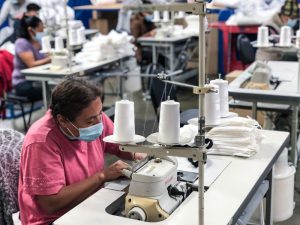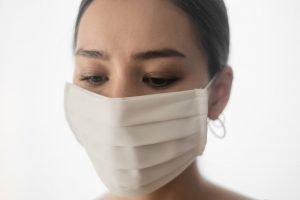 MONTEBELLO, Calif. — May 6, 2020 — When Steve Uretsky, founder and CEO of Los Angeles-based Allied Home, first directed his company to switch bedding production over to face masks, he had no idea where the masks would go or what the need was. But he knew it made sense, and that it would keep his employees working in a hard-hit market.
MONTEBELLO, Calif. — May 6, 2020 — When Steve Uretsky, founder and CEO of Los Angeles-based Allied Home, first directed his company to switch bedding production over to face masks, he had no idea where the masks would go or what the need was. But he knew it made sense, and that it would keep his employees working in a hard-hit market.
Allied, the down supplier and maker of bedding, is going one step further by not only producing face masks, but selling through to hospitality, retailers and even direct to consumer, as well as donating some to worthy causes as soon as they were made.
A family owned and run company for more than three decades, Allied Home pivoted to keep employees working and provide much needed personal protective equipment (PPE) not only to its own neighbors most in need through Los Angeles-based homeless shelter Union Rescue Mission (URM), but to NYFD, Cedars Sinai, and other front line workers around the country.
“As a global company with down processing and bedding facilities in China, we saw just how significant of an impact the virus was going to have on the economy and how people function in their daily lives,” Uretsky said. “Here in the states, we figured that masks would become a part of our everyday life for a while. We started to think very hard about how we could help and fortunately, we had the resources.”
Allied Home quickly pivoted as Uretsky directed the 80,000 square foot bedding division to switch a large portion of its production over to face masks, using the tightly woven, allergen-barrier cotton usually reserved for fine pillows and comforters to make breathable, washable face masks.
The retooling of the bedding facility was accomplished in just a matter of days, and they’ve even expanded capacity: Allied now employs more people than it did before the pandemic, and is producing 10,000 masks per day.
“When the U.S. started being hit by this virus and the response was to shut down businesses, everyone went into reactive mode. That’s understandable. But we quickly realized that as a global brand doing business locally, we could pivot and do things to try and make a difference,” Uretsky explained. “By shifting as much of our bedding production as possible to making face masks per the recommendation of the CDC, we’re able to keep people working here in LA, while providing much needed PPE for front lines workers, those in essential positions who are unable to stay home, and look closely at where we could additionally help within our community here in LA.”
Allied quickly got the products up for sale on its Home Bedding website and began donating masks and other bedding to homeless shelters and critical workers citywide. That effort uncovered a need that no one else was talking about — how do we protect those who can’t protect themselves by following CDC guidelines?
People experiencing homelessness are most susceptible to complications or death as a result of this disease because they are the least able to follow CDC guidelines to prevent the spread of the infection. According to research, an unsheltered individual infected by the novel coronavirus would be twice as likely to be hospitalized, up to four times as likely to require critical care, and two to three times as likely to die than the general population. (UCLA Study).
Based on the recommendation of homeless advocacy group HousingFirst Lab, Allied connected with URM on Skid Row, which is the largest homeless shelter in the city with a capacity greater than all other shelters combined. URM was recently in the news as the pandemic hit the shelter itself. The fears of a pandemic infecting America’s largest unsheltered community was realized with the death of a resident and one of URM’s employees. ALLIED is now providing enough masks for URM’s entire staff and residents at its downtown location.
The Department of Housing and Urban Development estimates that almost 700,000 people can experience homelessness on any given night in the U.S. Of those, 58 percent are living in shelters and transitional housing, while another 42 percent are unsheltered. But other estimates show closer to 2 million people homeless in the U.S.
“Established 1891, and the oldest and largest rescue mission in Los Angeles, URM could not have saved the lives of so many, without very generous partners like Allied Feather & Down,” said Andy Bales, president and CEO of Union Rescue Mission. “We have never turned away a woman, child or family from our doors and, due to the extra challenges presented by the pandemic, these masks will help ensure we can continue to provide safety and shelter to this vulnerable community and our neighbors.”
By now it is widely reported that American healthcare workers are facing a shortage of face masks and other PPE as we continue to fight the COVID-19 pandemic. The unsheltered community, however, still remains relatively unmentioned and the one most at risk.
Consumers and healthcare workers are finding that cotton masks such as the ones being produced by Allied are more breathable and comfortable, with less fogging of glasses, and importantly, they are able to be washed after each use for repeated wear (protecting more people longer and keeping disposable masks out of landfills).
Allied’s Allergen Barrier Face Masks are made of two layers of tightly woven 233tc Cotton that blocks irritants such as allergens and dust from passing through the material. The cotton material contains a special weave that makes the fabric more resistant to the penetration of airborne particles than a standard cotton textile.
Allied has also partnered with FUZE biotech to treat the masks with a proprietary and cutting-edge fiber infusion that creates a protective barrier. The barrier remains effective if CDC guidelines on washing reusable masks cannot be observed. Most viruses live by attaching to bacteria and other viruses as a host. Creating an environment that does not allow bacteria to grow reduces the risk that such viruses can live, remain on, or be transferred on the material itself. The treatment is applied through a fine mist on the bulk material, and is safe for both the environment and user. The added protection allows the mask to be worn more than one time without washing.
“The Allied Allergen Barrier mask was designed to be an extremely effective comfortable cotton mask that could be worn for long periods of time. Combining the resources of all divisions of the company to provide a protective mask with such innovative and effective technologies is something we are very proud of. We are equally proud to be able to provide these masks to the people on the frontlines and further help keep those safe who find it impossible to social distance because they have lost their home,” Uretsky said. “As a family owned company, we were here for you before this crisis, and we’ll be here for you when it’s over.”
Here’s how you can help us help others
Allied is taking online orders at its websites AlliedHomeBedding.com and DownLinens.com. We are donating one mask (just like the one you purchase) for every mask sold. There are over 16,000 unsheltered people in the city of Los Angeles alone, and that number is growing every day. A great number of masks are needed and we need your help. If you can assist, you can also go to the website to purchase masks that will go straight to the Union Rescue Mission to help continue to keep the homeless population safe and healthy. Even in the best of times, over three unsheltered people in the city of Los Angeles die every day. We all need to help each other to make sure that does not continue even in the midst of a pandemic.
Posted May 6, 2020
Source: ALLIED Home





